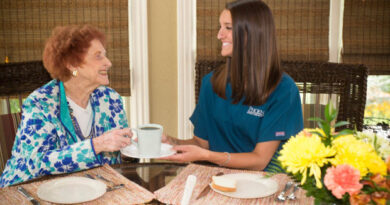The Best Books for Caregivers of Family Members Receiving Home Health Care or Hospice
The Best Books for Caregivers of Family Members Receiving Home Health Care or Hospice
Caring for a loved one at home is exhausting and often thankless work, even with help from home health care aides and nurses. It’s easy to lose your energy, get confused about navigating the healthcare system, and feel like you have to deprioritize your needs.
Thankfully, thoughtful authors with expertise in caregiving and psychology have written highly recommended books to help you adapt to your new lifestyle, at least for while your loved one relies on your help.
Consider buying or borrowing from the library one of these caregiver books to learn more about how to embrace your responsibilities, refresh your mindset, and provide the best possible care to your loved one, in conjunction with your home health care agency or hospice care provider.
The Conscious Caregiver: A Mindful Approach to Caring for Your Loved One Without Losing Yourself by Linda Abbit
A caregiving veteran, Linda Abbit’s book shares her expertise on caring for an older parent with the necessary patience, selflessness, and tenderness, while still prioritizing your own self care and self love and avoiding burnout and exhaustion.
This book for caregivers provides advice on caring for your loved one, regardless of whether it’s a full-time role for you, or if you’re also receiving support from home health or hospice. You’ll learn how to talk to your family, overcome stress, protect your finances, and more. The bottom line: taking care of a loved one requires that you take care of yourself, too.
Living with Dying: A Complete Guide for Caregivers by Jahnna Beecham and Katie Ortlip
Co-authored by a National Geographic writer and a registered nurse and licensed clinical social worker, this book on caregiving focuses on caregivers with loved ones receiving hospice care. In pursuit of a “good death,” Beecham and Ortlip address how to handle a loved one’s health emergencies, legal matters, and imminent passing while in hospice.
Considered an “easy-to-use guide,” the book helps caregivers navigate their journey, collaborate with hospice nurses and home health care, while caring for yourself and getting your loved one’s affairs in order.
Things I Wish I’d Known: Cancer Caregivers Speak Out by Deborah J. Cornwall
Based on more than 100 formal interviews with non-professional caregivers of cancer patients, this book for caregivers captures their thoughts and insights. Readers can draw on the practical lessons from others’ experiences through this narrative that helps them to understand and cope as they fight cancer together, make important treatment decisions, and plan for what the future may bring.
Topics covered include pursuit of an accurate cancer diagnosis, choosing treatment options and palliative care, communicating with doctors, accessing clinical trials, managing finances and legal issues, talking to children about cancer diagnoses, and more. Interviews even contain insights on how a diagnosis affects a caregiver for the long-term – valuable information for someone whose loved one needs their help.
Making Tough Decisions about End-of-Life Care in Dementia by Anne Kenny
Families of dementia patients must make end-of-life decisions about medical treatment, legal matters, money, and even living situations for people who no longer can. As a caregiver, you may feel intensely sad, guilty, confused, angry, or exhausted. If that sounds familiar, then this book about caregiving is for you.
Dr. Anne Kenny, a palliative care physician, describes navigating late-stage dementia “with sensitivity, compassion, and common sense.” Based on her personal experiences caring for her own mother and with her medical expertise, Dr. Kenny’s advice helps readers like you prepare for a loved one’s death while acknowledging their own mental health and emotional needs.
Like so many other books on caregiving, this one delves into making life-altering decisions while preparing for the inevitable death of a loved one; having difficult conversations with other family members; handling legal and financial matters; and considerations for medical care, insomnia, medication, and daily living.
Multicultural Guide to Caregiving: Essential Resources to Help You Balance Traditions Without Losing Your Mind or Money by Angelica Herrera Venson
Gerontologist Dr. Angelica P. Herrera Vinson shares personal stories and field experiences with communities of color and first-generation Americans in this important caregiver book. Not only does this book cover important social programs and aging services you may need to access, but it also addresses the cultural traditions and demographic changes that may affect how you approach your role as a caregiver to your loved one.
This book helps you understand how to manage elder care, especially in minority and immigrant families, as you make vital decisions about housing, finances, and medical crises. The biggest takeaway here is that you are not alone.
Daily Comforts for Caregivers by Pat Samples
With 366 daily meditations, this special book for caregivers helps to bring peace of mind to those struggling with their responsibilities of caring for someone with health issues. Here, caregivers get compassionate encouragement in easy-to-read language.
Not a how-to manual, Daily Comforts for Caregivers will validate your feelings and give you strength. It’s also a great gift for the caregiver in your life.
The Art and Science of Caregiving: Stories of Inspiring Elders with an End-of-Life Guidebook by Annelise Schinzinger
Written by a 25-year veteran of caregiving, this book’s poignant stories and guides help people just like you navigate caring for an elder approaching the end of their life. You’ll learn foundational tools to giving comfort to the dying as you find joy in your own life; discover how to become a better listener and communicator; find out the best ways to communicate with someone with dementia or Alzheimer’s; how to prepare for the end of life; therapies that can be helpful, including pets, essential oils, and music; and ways to deal with stress.
As a caregiver, your soothing presence calms those who are frightened as they near death. Schinzinger’s book will help you prepare for these important moments in your own caregiving responsibilities.
The Caregiver’s Encyclopedia: A Compassionate Guide to Caring for Older Adults by Muriel R. Gillick
Written by a geriatrician with more than 30 years of experience caring for the elderly, this book for caregivers offers everything you need to know as you take care of your loved one.
Whether you need to make major medical decisions, prevent burnout, navigate Medicare, and weigh the benefits of home health care, hospice, or nursing homes, Dr. Gillick addresses it in this guide meant to help you “think like a doctor.” You’ll even discover a list of medical supplies to have on hand, learn about preventative care, and understand geriatic syndromes, including delirium and falls.
Books on Caregiving Aren’t Enough. Get Skilled Help with Home Health Care and Hospice.
When you need respite from caregiving, or when your loved one needs skilled care from nurses and home health aides, it’s time to turn to Phoenix Home Health Care, serving Missouri, Illinois, and Kansas.
Our commitment is to improve the quality of life for the people we serve – both our patients and their families. We understand how important compassion is and strive to deliver it every time we interact with you.
To learn more about qualifying for home health care or hospice, contact us online, or speak to your loved one’s physician.
– By Nikki Dalene
Phoenix Home Care & Hospice
2945 SW Wanamaker Dr., Suite B
Topeka, KS 66614
785-260-6444





